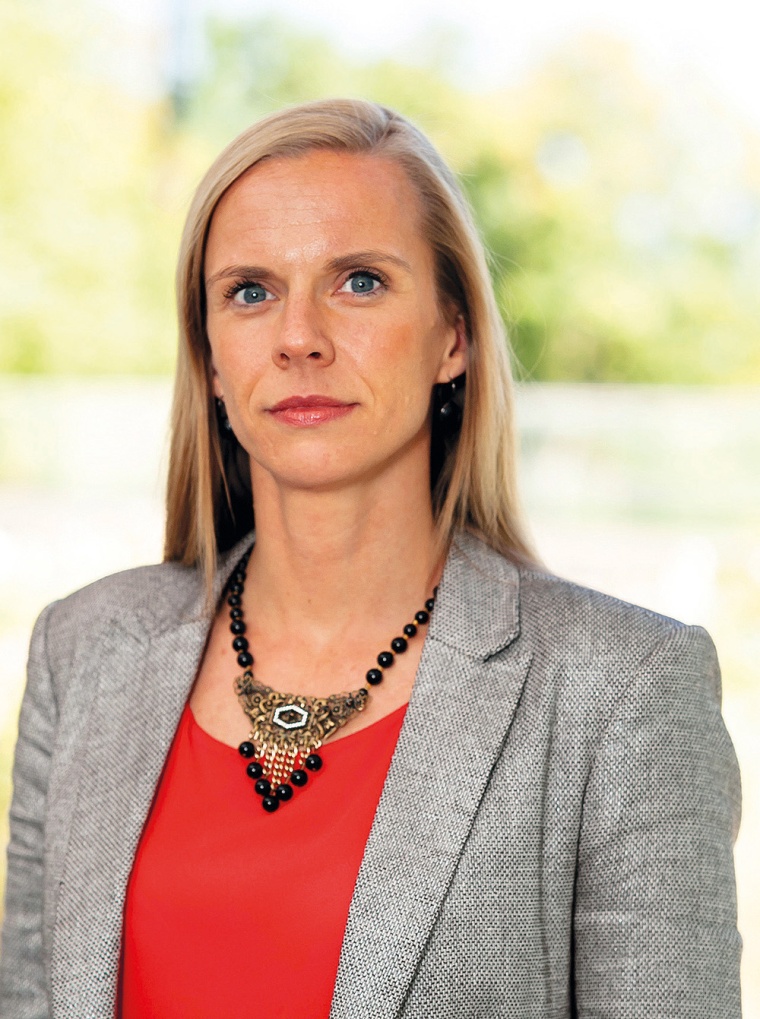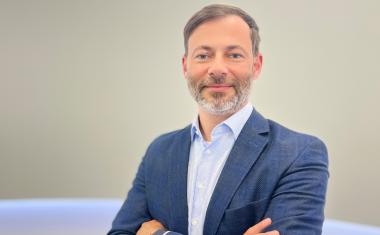The Risks of a Globalized World
Dr. Anja Opitz is responsible for the “International Politics and Security Policy” department at the Academy for Political Education in Tutzing, Germany. She conceives and leads symposiums, expert forums or seminars that are held for various disseminators – currently, for example, a seminar on the strategy ability of the German Bundeswehr in the context of the global security architecture. The Academy aims to bring science and practice together – so Opitz also concerns herself with research into the nexus between health and security as well as with the European security and defense policy. She is also President of the Global Health Security Alliance (GloHSA). Matthias Erler from GIT SECURITY spoke with Dr. Anja Opitz.

GIT SECURITY: Dr. Opitz, since its foundation on 1957, the Academy for Political Education in Tutzing wishes to contribute to political education – for the political and scientific worlds through to the general public. Which target groups do have in sight with this research? Can companies also benefit from this?
Dr. Anja Opitz: The Academy is a forum for information, research and conversational exchange, but also a place for networking for representatives of politics, business, science, the public, media or education. We employ an interdisciplinary approach in all our various activities. Companies also belong to our disseminators that appreciate these events because they obtain expertise specifically relevant to them. To give just one example from my department: there are companies that invest in regions that are affected by conflicts. Employees can therefore obtain training from us on the corresponding conflict structures or security relationships.
There have been warnings for a long time both from yourself and from the general scientific community about global pandemics. In 2012 there was a risk analysis made for the Federal Republic of Germany in which even the Coronavirus was mentioned…
Dr. Anja Opitz: Yes, in the recent past it was in particular the two Ebola epidemics of 2014/2016 in West Africa and 2018/2020 in the Democratic Republic of Congo as well as the SARS pandemic of 2002/2003 that brought the awareness of such challenges sharply into focus. The report on risk analysis in civil protection from 2012 that you mentioned also included the scenario of a pandemic, initiated by the fictive virus ‘Modi-Sars’, and it provided a corresponding risk portfolio for Germany. Such analyses however only form a good basis for prevention if they are regularly checked and updated, and this was sadly not the case here.
Then let’s talk a little more in detail about the current Corona pandemic. To start with: such a pandemic is really quite a common occurrence – just not in our latitudes or worldwide like right now?
Dr. Anja Opitz: Epidemics, that is the appearance of a highly infectious disease in a regionally limited area, do occur frequently. The risk of a global spread to become a pandemic increases significantly in a globalized world for various reasons. SARS spread in 2002/2003 quicker as its pathogen could be identified, a Coronavirus unknown until then. So-called zoonoses, infectious diseases that are transmitted between animals and humans, are one of the main causes of epidemics. The mobility of humans is increasing; they are potential carriers of pathogens and thereby assist their global dispersion; Covid-19 showed us how. Even Europe can be a starting point for endemic infectious diseases. In 2019, the first infectious cases of the West Nile Virus were diagnosed in humans in Germany. The virus is capable of surviving winter here; longer and warmer summer periods promote the spread, according to an estimate of the Robert-Koch-Institute (the German federal government agency and research institute responsible for disease control and prevention). In Greece and Italy we experienced the return of cases of malaria, to mention just a couple of examples.
One could then say, in principle, that knowledge of the best way to deal with pandemics is to a large extent widespread around the world – we just have to come to the right conclusions?
Dr. Anja Opitz: No country can be one hundred percent ready for a pandemic of course. But there are various experiences, research results and best practice strategies available to provide support, and from which one should deduce the lessons for the future. It is astonishing that, even in 2019, the Global Health Security Index showed in its results that countries are either hardly or not at all prepared for catastrophic events such as pandemics or epidemics. I am of the opinion that we must deeply reconsider the fundamental core of preventive measures. Do we continue to ignore cooperation with the vetinary sector with regard to ‘health security’? How do we include the matter of digitalization in case analysis? Will we be able to develop global indicator systems for the identification of potential dangers and, above all, are countries ready to invest in them?
In our earlier conversation, you gave an example that even large international organizations were only allegedly, but in fact not sufficiently prepared for Corona. Where was the problem?
Dr. Anja Opitz: If you compare the results of the annual Global Risk Report of the World Economic Forums, it becomes clear where the problem lay: it was always understood that such crises not only affect the health sector, but also mean massive sacrifices for commerce and society. But the likelihood that these major events would happen globally and to such an extent as we are currently experiencing with Covid-19 has been consistently underestimated in recent years.
Should companies prepare themselves for pandemics in a similar way to other global phenomena such as the increasing cybercrime, the climate change etc.?
Dr. Anja Opitz: Yes. The occurrence of such hybrid challenges or threats will be ever more likely in the future. Pandemic risk management should therefore be an integral part of every business continuity strategy. Or round the other way: business continuity should be based on a risk evaluation of the potential effects of an epidemic or pandemic on the company. And this requires a comprehensive understanding of the causes of these so-called cascading phenomena.
Can the fundamentals of crisis management also be applied for such pandemics? The installed processes have often not been effective?
Dr. Anja Opitz: Crisis management is a very broad term. My view of it is influenced by my interpretation of the general German term “Sicherheit”. In the English language, it can be clearly distinguished between ‘security’ and ‘safety’. On the one hand it is about ensuring security through reaction and prevention; on the other hand it is safeguarding. If you focus on the aspect of prevention, this is the recognition of various dangers, the understanding of their complex causes, the development of corresponding scenarios and, building on that, the calculation of the resources needed for risk-minimizing steps. And the usual approach toward faults or potential interruptions of processes with a view toward (human) resources is not sufficient. The key is the networking of competence from different industries and the resultant regular exchange of information.
In spite of all preparation, there can hardly be any really effective formula to deal with the interruption of supply chains. What fundamental options are available in your view for companies to rescue their business models during such crises and to quickly be back up to speed?
Dr. Anja Opitz: I believe the following elements are at the core: pandemics have their own functional logic. In a similar way to conflicts, they follow a – let’s call it – pandemic circle. They mostly progress over a long period of time and go through various different phases. This requires a high degree of flexibility and adaptability from the various industries. The development of a company-specific warning system that can recognize the relevant uncertainties and risk dependencies in various phases of the pandemic would therefore be essential. The corresponding business model would have to be measured and tested during these periods to survive the crisis.
How does it look for small and medium-sized businesses – do they also have appreciable potential to prepare themselves better?
Dr. Anja Opitz: This reminds me of a sentence contained in the WHO Influenza Risk Management Concept (2017): the business model itself can be a threat for the resilience and/or continuity of the business. That’s why it is so important particularly for small and medium-sized businesses to ensure that their business model is able to develop some ability to resist external disturbances such as an epidemic or pandemic. And this includes the consideration that the period of time between two epidemics or pandemics will get shorter. My advice is therefore not only to focus on survival during the current pandemic but already to lay the foundation to be able to resist another crisis of this sort in the future.
To what extent can political frameworks and measures be improved to be better able to cope with pandemics in the future?
Dr. Anja Opitz: The current pandemic has shown that just the usual focus on strengthening and investing in the stability and effectiveness of the healthcare sector is not enough. Aspects such as discovering the causes within the veterinary sector come to mind, as do the buffering of the consequences of a pandemic for commerce and society, but also the security-related development, an aspect that is all too often negated. Fifty percent of the failed health projects globally are in countries that are affected by conflict and war. The secondary effects of the Covid-19 pandemic for these countries will be more severe than the commercial effects here in Europe. Countries of the international community should distance themselves from the usual nationalistic ways of thinking and invest in the multilateral bodies: in die UN, the WHO and die EU. Inter-departmental international crisis management requires a political commitment. And that means not just a reaction to a health crisis, but inter-departmental prevention. Amongst other things, this means establishing the resources required on the basis of the question: are we prepared with the right resources for a mass event such as a pandemic? Do we have the necessary intelligence capacity available to recognize dangers, also in the form of bioterrorism? Is there an industry-wide reporting structure?
You are also President of the Global Health Security Alliance (GloHSA). Could you broadly describe this association, its members and the tasks it has set itself?
Dr. Anja Opitz: The core element of the alliance is its interdisciplinary character: GloHSA is an independent, charitable non-profit association; a network of international experts from politics, science, the private sector as well as the security and healthcare sectors that we founded in 2017. Our experts are unanimous in the common opinion that healthcare, security and stability problems are having increasing and interrelated global effects that make a transnational and multi-sectoral approach to the reduction of threats necessary. The aim of GloHSA is to provide effective networking of the various stakeholders with decision-makers to produce concepts for the solution of global challenges in health security.
GloHSA offers analyses and advice. What role has the association played and is it currently playing during the Corona pandemic?
Dr. Anja Opitz: Many of our members are currently involved in work against Covid 19, amongst others in the USA, in France, the Ukraine, Great Britain, Germany, Belgium and Italy; whether it’s on the medical side for the treatment of intensive care patients, through the support of our armed forces – for example in contact tracing as well as in the international support of African states – or as experts in the area of health security intelligence, it’s all to do with the global collection of data on the spread of the coronavirus. In addition, we are currently trying to provide increased support in the development of national and transnational strategies and in the realization of crisis-related studies and scientific analyses.
The corona pandemic is to some extent ‘nothing new’ on a global scale. How do you see things developing from this point of view? Can you deduce from typical progressions when the virus will be largely overcome? Would you give a broad prognosis?
Dr. Anja Opitz: It would be very presumptuous of me to give a prognosis here because I am neither a virologist nor an epidemiologist. But what I can say from my point of view is that the development of various vaccines or other medical and medicinal treatment methods signifies a turning point towards the end of the pandemic. That doesn’t necessarily mean that the pathogen itself has been overcome. I’m thinking here of other infectious diseases such as measles, HIV, malaria, polio etc. The aim is to stop the spread by interrupting or stopping the infection methods and thereby to be in a situation where a healthcare system does not reach the limits of its capacity because of an outbreak of some disease.
Contact
Dr. Anja Opitz,
International Politics & Security Policy
Academy for Political Education
Tutzing, Germany
Tel.: +49 8158 256 54
a.opitz@apb-tutzing.de
www.apb-tutzing.de














